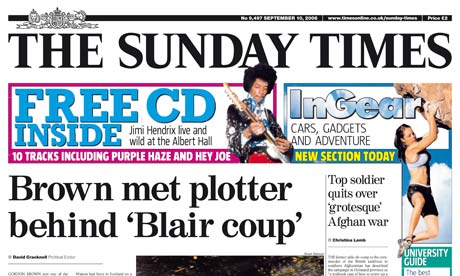
It is an interesting world that we live in these days, and no doubt this is an expression you may have heard many times before however it just always fits the scenario so well regardless of what the topic may or not be and this time does not disappoint. Today I sat down and proposed a set of hypothetical questions regarding challenging situations facing some company’s, none of the items or actions that I will question are criminal acts, some may present civil remedies if addressed in a court but none are illegal.
This may surprise some of you, after all I will use the words “stolen” and the expression “rob you blind” in a couple of the questions I propose to ask , but of course if these hypothetical situations were happening to your company then maybe you might see it that way too. Expressions and claims like these are often bandied about so their inclusion in my hypothetical questions does not mean the assertion itself is true and I suppose that is part of the problem as I see it.
The devil is in the detail in all of these questions as I explore real life examples of remedies that set to corrupt archaic laws and refashion their use to suit companies that refuse to adopt to a changing set of circumstances as man kind moves to the digital age and leave the analogue behind. I hope to illustrate the very inventive but morally corrupt ways that the companies that are experiencing the very things that I have questioned and what they are doing in response.
And although it is might seem strange that nothing on my list is illegal or criminal it should seem alarming that the companies facing some of these problems are turning to lawyers, politicians, the courts and international treaties to address the issues and provide solutions that their lack of vision have allowed happen to them. These companies armed with copyrights, patents and trademarked ideas and concepts are attempting to reinterpret existing laws and expand their scope to cover things that were never envisioned.
What do you do if your customers have abandoned your business model and embraced other technological solutions offered by others who have no respect for your intellectual property?
Well you might just sue your customers and sue and sue and ask law enforcement to prosecute the providers of the software that has provided the means for your customers to steal from you and then maybe lobby politicians to enact laws that protect your obsolete and analogue product’s business models because of all this supposed theft.
I feel the problem with the music industry is it’s not that people are not consuming or paying for music, it’s just under the old and very successful analogue model they consumed less and paid more, so why they ask can’t we they have the status quo but would prefer that if they customers consume more they pay more. The initial response to this change in landscape for the music industry was to hold on tight to the old model and to confuse consumption of a digital product as a lost sale and based on this premise present huge losses as a need to act to government and huge losses can only mean lost jobs a currency the government deals in.
It just popped in to my head “constraints”, I was thinking about how I could illustrate a point using an analogy that the music industry could understand about the economics of supply and demand and the different between a scarce item and an abundant one, and I could because its easy and its been done before.
But then I realised they must know this and all their actions show that rather than adapt to the realities and opportunities that new technology holds they would prefer to use technology to create constraints to the digital alternative by creating locks on others using the resources as if they are a recreation with the physical limitations of a scarce tangible product.
It just means that because technology allows us to have unlimited access to resources of music and film that we should pay the prices that a locked and closed physical world allowed. I am not arguing that content should be free and that although I would prefer that price I understand that content needs to be made and that a return on capital is required.
What do you do if you’re a company that feels that some one has innovated just a little too much and that now you can’t compete on equal terms any more?
Well you can do what a lot of successful companies have done rest on your laurels and use your arsenal of patents to sue them for damages and then extort exorbitant licensing fees from them or just become a patent troll acquiring and suing the real innovators.
This approach undermines the very reasons that patents exist they are meant to foster innovation and provide some recourse and artificial property rights in exchange for sharing the knowledge of said invention, however it would appear that everybody has to play the game for it to work.
What happens is that you may not seek to patent your inventions and to share your ideas however the cost of doing this is that others can accuse you of patent infringement of their intellectual property or worse having your own intellectual property ideas patented by others. So you as a company keep building this impenetrable fortress of patents, it is as broad as possible to fend off others and it can also be used to sue others in the hope of a big settlement if the competition gets too tough.
In the early days of software development in the United States of America business practices could not be patented and software was correctly viewed as a business practice. Software innovation boomed with out the need to constantly patent and defend, this has of course changed and software has been patentable for a while now, I don’t think that it has had the intended outcome that proponents of patents would argue it has and seems that the courts are dealing with business disputes that should have no legal standing at all.
What do you do if you hear negative feedback about your company and although it may be true and you don’t want others finding out about it?
These days the easy and most efficient way is to accuse them for defamation in the hope that they will just shut up and go away, well that if is you know who they are but even if you don’t then that’s OK just sue the service provider that hosts the content, exert a bogus copyright or trademark claim and have a DMCA notice issued.
The internet has opened up the opportunity for people to blog and comment on issues of concern, the same way that the invention of the printing press allowed the expansion of expression to the masses. The internet has broadened this concept allowing two-way interactions on a level never before experienced. However not all commentary is complementary and some although the comment in question may very likely be true, it may question the companies policies and procedures in ways the company would prefer nobody else knows. Companies use varying methods to tackle the issue, but surprisingly talking to the aggrieved customers about the issues is seldom one of the approaches taken. No these type of organisations rather than dealing with the root issues will very quickly send a lawyer's letter demanding retraction of the comments or commentary at issue. Many people fearful of courts and the legal system reluctantly compile with the demand and the problem goes away for this company free to continue the practice that first aggrieved their customer with no one the wiser.
However some people choose to ignore these legal threats knowing that one they are telling the truth and the law is on their side. This is where is gets deceptive and bogus copyright claims are used to issue a DMCA takedown notice against the web hosting company or the ISP. To maintain safe harbour under US copyright law these must be complied with, the aggrieved party can issue a counter notice, but then it starts to get real tricky. If however the ISP and web hosting firm don’t buckle under this pressure and remove the content, the company may then try defamation or slander against you.
These are not what these laws or the courts were designed for and it is an abuse especially so as the large percentage of these cases happen in the home of free speech the USA. I would always advocate that companies attempt to deal with their disgruntled customers and fix the issues that have caused the complaint or comment on the first instance.
What do you do when the world has changed so much that you find out that not only are you not competing any more but that you never have really known how to compete at all?
I think this is a one for the newspapers and how they have adapted to the digital landscape and I have to say not well, I have written quite a few articles on how I feel about newspapers and their failure to accept the reality and adapt.
Hiding in your shell and demanding that all others do the same, or adopting an ostrich position with the head placed firmly in the sand is not in my opinion are not a sound business models yet any astute observer may have noticed this stance.
The most successful news aggregation and distribution models favoured big media. There were considerable barriers, being the high costs of entry, technological restraints as well as government regulation that conspired to keep news gathering and distribution in the hands on the minority. The news was owned by big media, they traded in this commodity, they controlled access and content, they were the licensed purveyors of news and if we wanted access we played by their rules. The internet changed this and big media have failed to adapt as yet, I think they will but paywall’s don’t appear to be the answer or does trying to lockdown content with the Hot News doctrine.
Now that the barriers to entry are no more that a PC and an internet connection these huge media conglomerates are hemorrhaging money, and blame their woes like the other industries that I have covered in this article on the internet.
If only the horse drawn buggy industry had fought so hard the carbon emissions debate would not exist, as we all caught the buggy to work. These industries need to realise that they need to adapt and adjust to the new medium pretending you still hold the reigns on control is just embarrassing as is their actions to date. The internet has made many people rich, not because they stole from legacy industries but because they adapted to the changing landscape and most importantly worked out who their customers were and who was going to pay, these are not necessarily always the same.
What do you do if you find that commercial success has eluded you and all the hard work that you have done is being stolen from right under your nose?
Monetize piracy and turn to the tried and true extortion ratchet. Success used to be measured by sales or ratings but in reality the only true gauge to a company is in cold hard cash and the actual dollars and cents. These days although you have had a sum what successful and acclaimed product and yet not see any of the financial rewards that you feel are owed. So it is a no surprise that when these companies are approached by lawyers who having watched the successful abuse of the legal system by the RIAA in suing thousands of people who had downloaded non authorised content, decide to use the same approach.
The produces of the Hurt Locker have done just this
The company that produced "The Hurt Locker" is suing thousands of so-far unidentified people it says illegally downloaded the Oscar-winning war movie.
The lawsuit, filed Monday in U.S. District Court in Washington, D.C., by Voltage Pictures LLC, seeks damages and an injunction against 5,000 people it claims used an anonymous file-sharing protocol called BitTorrent to distribute copies of the movie, in some cases months before its release in U.S. theatres. Below is further details on the tactics from
arstechnica article you can read the full article
here
The move is part of a new international approach to recouping some of the money believed lost to online piracy. It is spearheaded in the US by a new entity calling itself the US Copyright Group, which has filed a host of such lawsuits in recent weeks against P2P users, mostly involving smaller independent films. The Hollywood Reporter first noted the lawsuit campaign, which isn't designed so much to stop piracy as to monetize it. t's pretty much straight from the RIAA playbook, though RIAA cases rarely ventured beyond the KaZaA network. BitTorrent could be more problematic, in part because each person often serves up only small bits of the files in question.
What sets these cases apart are that the parties believe they can make money; the RIAA always said it wasn't making anything on its campaign, in part because it actually pursued people like Jammie Thomas all the way through the court system, and on multiple occasions. This is obscenely expensive at the federal level, and it's not clear if the US Copyright Group really intends to take named lawsuits all the way to trial.
This is basically a extortion ratchet and nothing more.
What do you do if you’re in an industry that once dominated the world but now you are seeing other countries lax enforcement of intellectual property rob you blind?
Lobby politicians and take over trade treaty negotiations to implement a new world order all under the guise of an anti counterfeiting trade agreement.
Below is further details on the tactics from
arstechnica article you can read the full article
here
ACTA began in Berne, Switzerland on September 9, 1886. European countries came together and signed one of the first major copyright treaties, the Berne Convention for the Protection of Literary and Artistic Works, in part due to the influence of French novelist Victor Hugo.
Berne was revised many times over the next few decades, but it largely stuck to its original mission of dealing with copyright in books and artwork. In 1961, the Rome Convention for the Protection of Performers, Producers of Phonograms and Broadcasting Organisations added a major new set of copyright guidelines to address the needs of TV and record producers and actors—a case of the law changing with the times.
When the Internet crashed in upon the analog world of copyright in a terrifically disruptive wave, rights holders wanted Berne and Rome updated for this strange new digital era.
This new digital world put copying technology into the hands of the public, and the public went to town.
Well, you could pass another international treaty with tougher terms. But WIPO—why, there's too many nations who won't go along with further copyright restrictions, the whole process is (relatively) open and involves NGOs, and it's slow. These are all drawbacks. Instead, what about a smaller and separate process, with no unnecessary oversight, little transparency, and a "coalition of the willing"? Oh, and if you can set it up in such a way to avoid legislatures in countries like the US, that would be a big bonus.
So here we have ACTA a way to enshrine copyright protection on a global level through a back door so to speak.
What do you do if you see an innovative service that helps their users do the things they want to do with their own data by accessing your site with their user’s authorisation when these are your customers?
The problem is not that every case is the same, but that no two cases can ever be the identical and that the facts are never easy to determine, judges rely on precedents set in other rulings to guide decisions in interpretation of complex systems. So if a precedent is set using a dodgy application of law as a justification that justification can be argued and extended and that is what I feel is happening in many cases.
There is a case where Ticketmaster was able to have software banned because its use could violate the terms of service of its website. This software was able to utilize the limitations of the site and exploit them for optimal output. This is obviously something that should be praised and however it was not illegal to do so difficult to stop. Ticket scalpers were able to game the system using this software and so instead of getting Ticketmaster to fix its site they banned the software using corruption of existing laws to make violating the terms of use a criminal act.
Now in many jurisdictions ticket scalping is illegal so that there was no additional law required but this was not just about stopping ticket scalpers what if customers could use the software system themselves no this had to be stopped. So how do you outlaw the items used in a crime? Well you just corrupt another law in a case of if the end meets the cause, then who cares about the means.
So it would now appear that a company can write new laws into existence, in asserting non compliance to terms and conditions. But take this further and suddenly the justice system can be used against anyone whom fails to read yet alone obey a terms of service created by a private body, does this not sound creepy?
So you can sue a competitor for computer hacking and abuse for violating your terms of service, if they allow your customers to use their software to access your site if you say no and obviously can’t technically stop it. I think that no one should be held criminally liable for not obeying the terms of service on a website; however this is an end game that is being played out in increasingly more in today’s digital landscape.
So that is it a big list of what to do’s if you feel you no longer can compete since the internet has revolutionised the world. What do think do you have an opinion?
PQZZH3YN37CE













